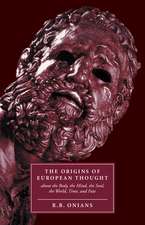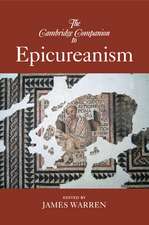Socratic Moral Psychology
Autor Thomas C. Brickhouse, Nicholas D. Smithen Limba Engleză Paperback – 11 ian 2012
| Toate formatele și edițiile | Preț | Express |
|---|---|---|
| Paperback (1) | 336.69 lei 6-8 săpt. | |
| Cambridge University Press – 11 ian 2012 | 336.69 lei 6-8 săpt. | |
| Hardback (1) | 696.80 lei 6-8 săpt. | |
| Cambridge University Press – 5 mai 2010 | 696.80 lei 6-8 săpt. |
Preț: 336.69 lei
Nou
Puncte Express: 505
Preț estimativ în valută:
64.44€ • 67.02$ • 54.00£
64.44€ • 67.02$ • 54.00£
Carte tipărită la comandă
Livrare economică 14-28 martie
Preluare comenzi: 021 569.72.76
Specificații
ISBN-13: 9781107403925
ISBN-10: 1107403928
Pagini: 286
Dimensiuni: 152 x 229 x 16 mm
Greutate: 0.42 kg
Editura: Cambridge University Press
Colecția Cambridge University Press
Locul publicării:New York, United States
ISBN-10: 1107403928
Pagini: 286
Dimensiuni: 152 x 229 x 16 mm
Greutate: 0.42 kg
Editura: Cambridge University Press
Colecția Cambridge University Press
Locul publicării:New York, United States
Cuprins
Introduction; Acknowledgements; 1. Apology of Socratic studies; 2. Motivational intellectualism; 3. The 'prudential paradox'; 4. Wrongdoing and damage to the soul; 5. Educating the appetites and passions; 6. Virtue intellectualism; 7. Socrates and his intellectual heirs: Plato, Aristotle, and the Stoics; Appendix. Is Plato's Gorgias consistent with the other early or Socratic dialogues?; Bibliography of works cited; Index of passages; General index.
Recenzii
"....Overall the book has much to recommend it, not least of which is the lively and engaging style in which the authors have managed to express what is.... provided scholarly and intelligent arguments for what remains a challenging and unorthodox thesis. The book deserves to be widely read."
--Scott Carson, Ohio University, Bryn Mawr Classical Review
"....The primary audience for this book is, consequently, scholars and students invested in Socratic philosophy.... One feature of the present book that scholars will thus eagerly welcome is its deliberate defense of Socratic studies as a viable research program.... SMP includes an appendix by way of supplementing the text-based defense of their decision. The book also offers a sustained discussion of what is perhaps the least developed element of intellectualist interpretations, namely, how it is that, for Socrates, harming another necessarily harms oneself.... thorough explanations of how, given their re-interpretation of Socratic intellectualism, Socrates’ moral psychology is to be distinguished from the moral psychologies of Plato, Aristotle and the Stoics.... The volume includes a thorough bibliography, general index, and an index locorum."
--Patrick Mooney, John Carroll University, Philosophy in Review
--Scott Carson, Ohio University, Bryn Mawr Classical Review
"....The primary audience for this book is, consequently, scholars and students invested in Socratic philosophy.... One feature of the present book that scholars will thus eagerly welcome is its deliberate defense of Socratic studies as a viable research program.... SMP includes an appendix by way of supplementing the text-based defense of their decision. The book also offers a sustained discussion of what is perhaps the least developed element of intellectualist interpretations, namely, how it is that, for Socrates, harming another necessarily harms oneself.... thorough explanations of how, given their re-interpretation of Socratic intellectualism, Socrates’ moral psychology is to be distinguished from the moral psychologies of Plato, Aristotle and the Stoics.... The volume includes a thorough bibliography, general index, and an index locorum."
--Patrick Mooney, John Carroll University, Philosophy in Review
Descriere
Arguing against Socratic intellectualism, this book explains why Socrates believed that emotions, desires and appetites can lead to error.














